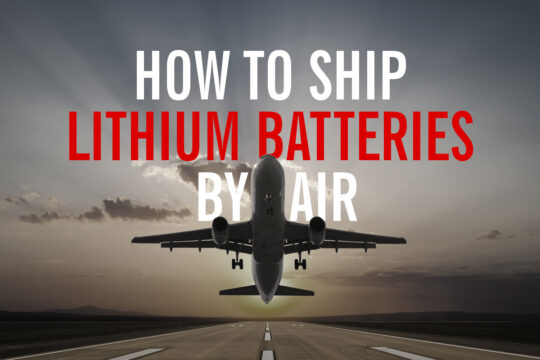Since 2016, when the International Civil Aviation Organization (ICAO) implemented drastically more restrictive global regulations on shipping lithium batteries by air, shippers have adapted and done their best to comply. Meanwhile, regulatory agencies continue to update regulation in an effort to keep lithium battery transport by air as safe as possible. The most recent change…
Getting You Ready — New Lithium Battery Marks and Labels are Mandatory on January 1st
As 2019 quickly approaches, lithium battery shippers need to be aware of the mandatory label changes that become effective on January 1st. For almost 2 years shippers of small (excepted) batteries and battery-powered devices have had the option to use either the lithium battery handling “Caution” label or the lithium battery mark while operating under…
11 questions every e-commerce device maker must ask about lithium batteries
Say you’ve invented a robot that doesn’t just vacuum floors, but cleans all the grime off your showers, sinks and toilets, too. (Let’s call it the “Bathroomba.”) If an informal poll here at Labelmaster is any indication, your brainchild will command a premium price and sell a million units by next Wednesday. There’s only one…
Confessions of a 3PL hazmat manager: “Lithium batteries are my life.”
Cody DeGrush is Hazardous Materials Manager at GEODIS. As a hazardous materials manager for a major third-party logistics (3PL) company, I’m almost a regulatory consultant within my own company. I share guidance with other organizations whenever regulations change, I gather information when onboarding a new client, and I oversee training. For the last four years,…
3 unexpected facts about Obexion lithium battery packaging
Since we introduced Obexion packaging technology last fall, we’ve had an unbelievable response from people who ship lithium batteries and battery devices. Many of the questions were predictable (even if the answers were amazing): Can Obexion really contain a 400°C lithium battery fire without gels, pellets or heavy liners? Yes—watch the video here. Can I…
Fall meetings highlight changes in Dangerous Goods air transport
The fall season in odd-numbered years has traditionally been a busy time for people who handle Dangerous Goods by air, and 2017 was no exception. Consider this timetable: Labelmaster’s 12th Dangerous Goods Symposium, Chicago, Sept. 6–8 IATA’s Dangerous Goods Board, 111th meeting in Brussels, Sept. 18–21 IATA’s Lithium Battery Seminar in Barcelona, Oct. 3–5 ICAO’s…
Is Obexion the lithium battery shipping breakthrough we’ve been waiting for?
To the surprise of absolutely no one, lithium battery shipping once again dominated the agenda at the recent 2017 Dangerous Goods Symposium. The story, in a nutshell: There will continue to be more and more lithium batteries and battery-powered devices to transport, and transporting them safely and compliantly will continue to be challenging. The big…
Is your operation ready for a lithium battery device recall?
Chris Harvey is Director of Recall Solutions at Stericycle Expert Solutions. This post is based on the white paper Taking Charge: Effective Management of Lithium-ion Battery Recalls. With complex and rapidly shifting regulatory requirements, lithium-ion batteries and devices present one of the greatest challenges of all product recalls. As a manufacturer in this environment, it…
Geoff Leach on hazmat training, compliance and the Dangerous Goods Symposium
Longtime Dangerous Goods veteran Geoff Leach will participate in the Technology & Training workshop during the 12th annual Dangerous Goods Symposium, September 6–8, 2017, in Chicago. “I get very cross when people say Dangerous Goods is dull,” says Geoff Leach, founder and director of The Dangerous Goods Office, Ltd. “How can any subject be dull…
Proposed laptop carry-on ban may put far more passengers in danger
Plans to ban laptops and tablets from the cabins of flights from Europe were put on hold when the European Union decided against implementation on May 17. But the ban remains in place for flights from eight Middle Eastern countries, and we persist in our opinion opposing it. By Neil McCulloch The proposed ban on…
- 1
- 2









